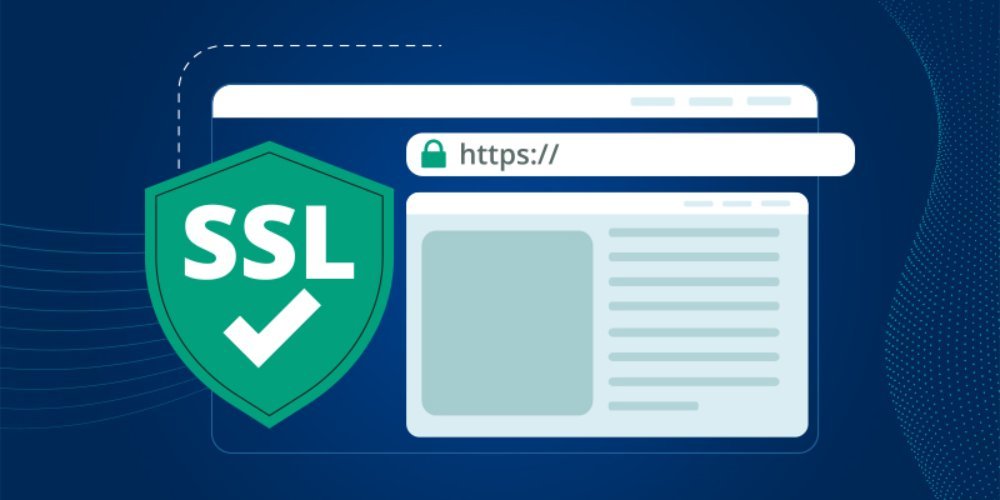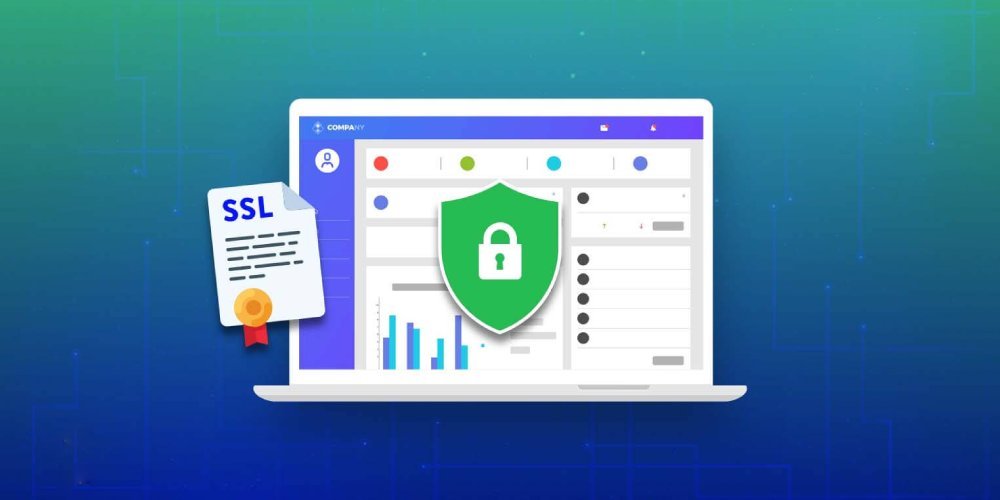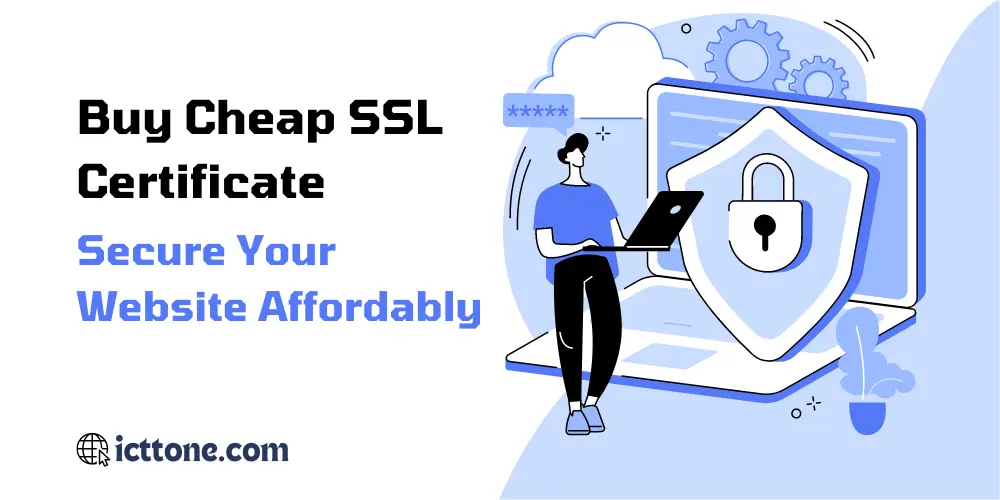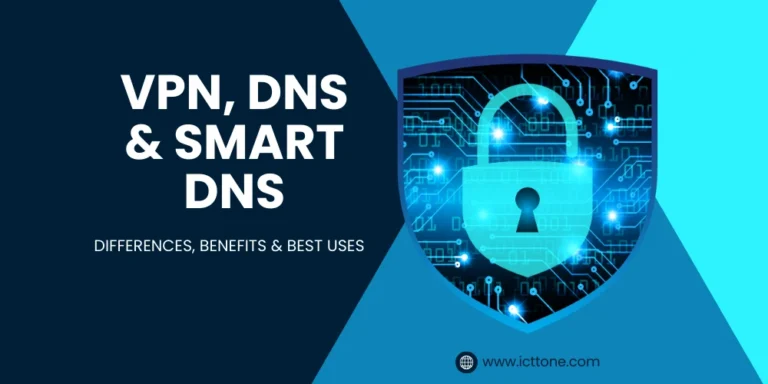In an era where cyber-attacks and data breaches are rampant, ensuring your website is secure should be a top priority. SSL certificates (Secure Socket Layer) serve as the backbone of website security, encrypting data as it travels between the server and the visitor’s browser. This prevents hackers from intercepting sensitive information such as passwords, credit card details, or personal data. For website owners, purchasing an SSL certificate is essential to maintain credibility, secure transactions, and protect their users’ privacy.
If you’re looking to buy cheap SSL certificate, there are plenty of affordable yet reliable options available from well-known brands. This guide reviews the best budget SSL certificates, helping you make an informed decision.
What is an SSL Certificate?
An SSL (Secure Socket Layer) certificate is a digital certificate that authenticates a website’s identity and enables an encrypted connection between a web server and a user’s browser. SSL ensures that all data transferred between the server and the browser remains private and secure. The technology was initially developed by Netscape in the mid-1990s, and it has since evolved into its more secure successor, TLS (Transport Layer Security). While we commonly refer to it as “SSL,” most websites today use TLS certificates to provide a secure experience.

When a website is secured with an SSL certificate, you’ll notice that its URL begins with “HTTPS” (as opposed to “HTTP”), and a padlock icon appears in the browser’s address bar. This indicates that the site is encrypted and safe to interact with, particularly if it involves the exchange of sensitive information, such as passwords or credit card details.
SSL certificates work by encrypting data into a format that can only be decoded by the intended recipient, thereby preventing hackers from intercepting or tampering with the information. They are essential for maintaining online security and building user trust.
Why SSL Certificates are Necessary for Websites
SSL certificates have become a non-negotiable for modern websites. As consumers grow more concerned about their online security, websites without SSL certificates are often deemed untrustworthy. Here’s why SSL certificates are critical:
- Data Encryption: SSL certificates ensure that data transmitted between the user’s browser and the server is encrypted and safe from potential hackers. This is crucial for websites dealing with sensitive information such as login credentials, payment data, or personal details.
- SEO Benefits: Search engines like Google give preference to secure websites. In fact, sites with SSL certificates are favored in search engine rankings, making SSL an essential part of your SEO strategy.
- User Trust: When a website has an SSL certificate, users see the padlock icon in the address bar, signaling that the site is secure. This symbol builds trust with visitors and reduces bounce rates.
- Avoiding “Not Secure” Warning: Without SSL, modern browsers display a “Not Secure” warning to users when they try to access the site, which can significantly damage your website’s credibility and deter visitors from staying on your site.
Even if your website doesn’t handle sensitive data, an SSL certificate is still essential. Visitors expect every website they visit to be secure. For this reason, it’s critical to invest in an SSL certificate, even if you’re looking for a cheap solution.
Importance of SSL for Online Transactions
The importance of SSL certificates cannot be overstated when it comes to securing online transactions. Whether you’re running an e-commerce store or processing user data for services, SSL encryption ensures that sensitive financial and personal information is kept secure from potential cyber threats.
1. Protecting Payment Information
Online shopping and banking involve the transmission of highly sensitive data, including credit card numbers, bank account information, and addresses. Without SSL, this data is vulnerable to interception and theft by hackers. SSL certificates encrypt this information, making it unreadable to anyone trying to eavesdrop on the connection.
2. Compliance with Industry Standards
SSL encryption is mandatory for websites that process payments. For example, the Payment Card Industry Data Security Standard (PCI DSS) requires websites to use SSL certificates to secure credit card transactions. Failing to comply with these standards could result in hefty fines and loss of business.
3. Trust and Conversion Rates
Security is one of the main concerns for online shoppers. If customers don’t trust your website to keep their data safe, they’re unlikely to complete a purchase. By installing an SSL certificate and displaying HTTPS, businesses can build trust with their customers, leading to higher conversion rates. According to studies, users are more likely to abandon a shopping cart if they don’t see clear indicators of security, such as the padlock symbol or HTTPS in the URL.
4. Preventing Fraudulent Activities
SSL certificates also help detect and prevent fraud during online transactions. With SSL in place, customers are protected from common threats such as man-in-the-middle attacks and data interception, where cybercriminals could steal sensitive financial information and make unauthorized transactions.
Different Types of SSL Certificates
When you decide to buy cheap SSL certificate, it’s important to understand the different types of SSL certificates available. Not all SSL certificates offer the same level of validation or coverage. Below are the main types of SSL certificates:
1. Domain Validated (DV) SSL Certificates
A Domain Validated (DV) SSL certificate is the most basic and affordable SSL certificate. It verifies only that the applicant has ownership of the domain. DV certificates are perfect for small websites or blogs that don’t handle sensitive user data.
- Pros: Quick issuance (typically within minutes), affordable, basic encryption.
- Cons: Does not validate the organization behind the website, less trust compared to OV or EV certificates.
2. Organization Validated (OV) SSL Certificates
An Organization Validated (OV) SSL certificate provides a higher level of trust than a DV certificate. In addition to verifying domain ownership, the certificate authority also verifies the organization’s identity.
- Pros: Higher level of trust, organizational details are included in the certificate.
- Cons: Slightly more expensive, takes longer to issue due to verification.
3. Extended Validation (EV) SSL Certificates
An Extended Validation (EV) SSL certificate provides the highest level of trust and security. EV certificates include a comprehensive vetting process, verifying the legal and physical existence of the organization. EV SSL certificates display the company name in the browser’s address bar, which increases trust.
- Pros: Highest level of trust, company name displayed in the browser, ideal for e-commerce or financial institutions.
- Cons: Expensive, takes longer to issue.
4. Wildcard SSL Certificates
A Wildcard SSL certificate secures a single domain and all its subdomains. For example, a wildcard SSL can secure both example.com and subdomain.example.com.
- Pros: Cost-effective for websites with multiple subdomains, convenient management.
- Cons: Typically more expensive than single-domain certificates.
5. Multi-Domain SSL Certificates
A Multi-Domain SSL certificate (also known as SAN SSL) secures multiple domain names under a single certificate. This is ideal for organizations with several different websites.
- Pros: Simplifies SSL management for multiple websites, cost-effective.
- Cons: Can be more complex to configure.
Each of these certificates offers different levels of validation and coverage. If you’re looking to buy cheap SSL certificate, Domain Validated SSLs tend to be the most affordable, but it’s important to choose one that fits your website’s specific needs.
SSL/TLS Certificate Features & Advantages
SSL/TLS certificates offer several key features and advantages that make them critical for website security. Here’s an in-depth look at some of the most significant benefits:

1. Data Encryption
The primary function of an SSL certificate is to encrypt data exchanged between the web server and a user’s browser. SSL uses asymmetric encryption (a combination of public and private keys) and symmetric encryption (shared keys) to scramble sensitive data like personal information, passwords, and credit card numbers. Only the intended recipient can decrypt the data, making it nearly impossible for cybercriminals to intercept or steal.
2. Authentication
SSL certificates verify that the website is legitimate and that visitors are communicating with the intended server. This prevents man-in-the-middle attacks, where malicious entities impersonate websites to steal information. SSL certificates are issued by Certificate Authorities (CAs) after a thorough verification process to ensure the authenticity of the website.
3. Integrity
SSL certificates protect the integrity of the data transferred between the server and browser. This means that data cannot be altered or tampered with during transmission without being detected. Integrity ensures that the information your website visitors receive is the information you intended to send.
4. Browser Indicators of Trust
SSL-secured websites display trust indicators, such as the padlock icon and “HTTPS” in the URL, which assure users that their connection is secure. Extended Validation (EV) SSL certificates provide an even higher level of trust by displaying the company’s legal name in the browser’s address bar. These indicators play a crucial role in establishing the credibility of your website.
5. Boost SEO Performance
Google and other search engines prioritize websites that use HTTPS. In 2014, Google announced that SSL is a ranking factor, meaning that having an SSL certificate can help improve your website’s position in search engine results pages (SERPs). This makes SSL certificates vital not just for security but for digital marketing and search engine optimization (SEO) as well.
6. Protection Against Phishing Attacks
Phishing is a common cyberattack where scammers create fake websites to trick users into providing sensitive information. SSL certificates help protect against phishing by verifying the legitimacy of a website. Visitors can easily identify a secure site by looking for HTTPS and the padlock icon, which aren’t present on phishing sites that lack SSL encryption.
7. Building Customer Trust
In an online world full of scams and fraud, SSL certificates help build trust with website visitors. When users see that a site is secured with SSL, they are more likely to stay, browse, and complete purchases, knowing that their personal and payment information is protected.
Single Domain SSL and Multi-Domain SSL Certificates for www and non-www Variants
When choosing an SSL certificate, it’s important to consider how many domains or subdomains you need to secure. SSL certificates come in different types depending on the number of domains they protect, including Single Domain SSL and Multi-Domain SSL (SAN) certificates.
Single Domain SSL Certificates
A Single Domain SSL certificate is designed to secure just one domain name. For example, if you purchase a single domain SSL certificate for example.com, it will only protect that domain and its www variant (i.e., www.example.com). Any other subdomains or additional domains, such as shop.example.com or example.org, would require separate certificates.
- Use Case: Ideal for small websites or blogs that operate under one domain name and don’t have subdomains.
- Advantages: Simple to implement and generally more affordable than Multi-Domain SSL certificates.
Multi-Domain SSL (SAN) Certificates
A Multi-Domain SSL certificate (also known as a Subject Alternative Name or SAN certificate) allows you to secure multiple domain names and their variations under a single certificate. For example, you could secure example.com, www.example.com, example.org, and shop.example.com with one certificate.
- Use Case: Best suited for businesses that operate several different websites or need to secure multiple domains.
- Advantages: Simplifies SSL management by covering multiple domains and subdomains with one certificate, saving both time and money.
www and Non-www Variants
When it comes to SSL certificates, securing both www and non-www variants of your domain is essential. A standard single-domain SSL certificate usually covers both versions. For instance, if your certificate is issued for example.com, it will also secure www.example.com. This ensures that visitors can access your site securely, regardless of which URL format they use.
- www vs. non-www: While there is no functional difference between www.example.com and example.com, it’s important to have an SSL certificate that covers both to avoid security warnings for users who might enter your site using either version.
SSL Site Seal: What Is a Site Seal?
An SSL Site Seal is a graphic logo displayed on a website, provided by the SSL certificate issuer, to signify that the site is secured by a trusted CA. The site seal is a visual indicator that the website is safe to use, especially for e-commerce sites or those handling sensitive information. It helps increase user trust and confidence, encouraging them to proceed with transactions or interactions on the site.
Types of Site Seals
- Static Site Seal: A simple, non-clickable image displayed on the website. It doesn’t offer additional information beyond indicating that the site uses SSL encryption.
- Dynamic Site Seal: A clickable seal that displays real-time information about the SSL certificate, including the CA’s name, validation status, and issue date. This type of seal offers more credibility because users can verify the site’s security details instantly.
Benefits of Using an SSL Site Seal
- Increased User Trust: A site seal from a well-known CA reassures visitors that the site is secured and that their data is safe.
- Boost in Conversions: Online shoppers are more likely to complete transactions when they see visual cues of security like a site seal.
- Easy Verification: Dynamic site seals allow users to verify the SSL certificate details, increasing transparency and trust.
Comparison: Static vs. Dynamic Site Seal
| Criteria | Static Site Seal | Dynamic Site Seal |
|---|---|---|
| Functionality | Non-clickable image | Clickable with real-time certificate info |
| Trust Level | Provides basic assurance of SSL security | Provides higher trust with verification |
| Visibility | Simple logo | Enhanced logo with additional security info |
| Use Case | Basic sites | E-commerce, financial, or high-traffic sites |
SSL Certificate Brands Overview
When shopping for affordable SSL certificates, it’s crucial to review the top brands in the market. Below are the best options available from The SSL Store: DigiCert, GeoTrust, Thawte, RapidSSL, Sectigo, and Comodo.

DigiCert SSL Certificates
DigiCert is known for providing top-tier SSL certificates that cater to businesses needing the highest levels of encryption and validation. While not typically categorized as “cheap,” DigiCert offers unbeatable security features, making it an excellent choice for large enterprises.

- Pros: Fast validation and issuance, top-notch customer support, comprehensive security options.
- Cons: More expensive compared to other SSL providers, better suited for enterprises than small businesses.
DigiCert’s premium SSL certificates are ideal for companies that prioritize top-notch security and can afford the extra expense. Despite the higher price, DigiCert certificates offer value through exceptional support, fast issuance, and industry-leading encryption.
GeoTrust SSL Certificates
GeoTrust is a well-known name in the SSL industry, offering a range of certificates from Domain Validated to Extended Validation at affordable rates. GeoTrust’s SSL certificates are perfect for small and medium-sized businesses that need strong encryption without breaking the bank.

- Pros: Affordable, wide range of SSL options, strong encryption.
- Cons: Slightly slower validation and issuance compared to DigiCert.
GeoTrust offers reliable, cost-effective certificates that cater to a wide range of website owners. If you’re looking to buy cheap SSL certificate for a business or blog, GeoTrust is an excellent option.
Thawte SSL Certificates
Thawte is a trusted SSL certificate provider with a global presence. Established in 1995, Thawte offers SSL certificates at competitive prices with a reputation for reliability. Thawte’s certificates are available in Domain Validation, Organization Validation, and Extended Validation options.

- Pros: Affordable, trusted globally, excellent for multilingual support.
- Cons: Longer validation times for OV and EV certificates.
Thawte is a great option for businesses looking for affordable and secure certificates, particularly those with an international customer base.
RapidSSL Certificates
RapidSSL specializes in fast and affordable SSL certificates, particularly for small websites, personal projects, or blogs that need basic encryption. RapidSSL focuses primarily on Domain Validated SSL certificates, making it a perfect choice for smaller budgets.

- Pros: Extremely affordable, quick issuance, easy installation.
- Cons: Limited to Domain Validated SSL certificates, not suitable for businesses needing advanced validation.
RapidSSL is the go-to choice for personal websites or small businesses needing basic, fast, and cheap SSL certificates.
Sectigo SSL Certificates
Sectigo, formerly known as Comodo, offers one of the most extensive ranges of SSL certificates in the market, including budget-friendly options for small to large businesses. Sectigo’s SSL certificates are known for their robust security and comprehensive features.

- Pros: Wide range of products, affordable pricing, high level of trust.
- Cons: Customer support can be hit or miss.
Sectigo provides a good balance between affordability and functionality, making it a great option if you’re looking for versatility in SSL protection.
Comodo SSL Certificates
Comodo, now rebranded as Sectigo, has been a long-standing player in the SSL market. Comodo SSL certificates are perfect for budget-conscious users looking for reliable encryption at a lower price point. They offer DV, OV, and EV certificates, as well as wildcard options.

- Pros: Highly trusted brand, broad range of SSL options, very affordable.
- Cons: Longer validation times for higher-end certificates.
Comodo is the ideal solution for those looking to buy cheap SSL certificate with flexible options, including multi-domain and wildcard certificates.
Comparison: Finding the Best Cheap SSL Certificate for Your Website
To help you find the best SSL certificate for your website, here’s a comparison of the key features of each SSL provider:
| SSL Provider | Best For | Price Range | Validation Type | Issuance Time |
|---|---|---|---|---|
| DigiCert | Enterprise security | High | DV, OV, EV | Instant to 5 days |
| GeoTrust | Small businesses | Affordable | DV, OV, EV | 1-3 days |
| Thawte | Global reach | Affordable | DV, OV, EV | 1-5 days |
| RapidSSL | Basic websites | Low | DV | Minutes |
| Sectigo | Versatility | Affordable | DV, OV, EV, Wildcard | 1-5 days |
| Comodo | Budget-friendly | Low | DV, OV, EV, Wildcard | 1-5 days |
GeoTrust and RapidSSL stand out as affordable options for small websites, while DigiCert is best for larger enterprises seeking top-tier security.
The Best SSL Certificate Providers / Cheap SSL Certificates Providers
When shopping for SSL certificates, you’ll encounter several trusted providers offering different levels of encryption and pricing. Here’s a comparison of some of the best SSL certificate providers and cheap SSL certificate providers:
1. DigiCert
- Overview: One of the most reputable SSL providers globally, DigiCert offers premium SSL certificates known for their security and trust. They are known for their quick issuance times and exceptional customer support.
- Best For: Large enterprises, e-commerce, and high-security websites.
- Price Range: High, starting at around $200 per year.
- Features: Organization and Extended Validation, fast issuance, and site seals.
2. GeoTrust
- Overview: GeoTrust is another reliable provider, offering SSL certificates at more affordable rates compared to DigiCert. It is ideal for small to medium businesses that need secure, trusted SSL certificates.
- Best For: Small and medium-sized businesses.
- Price Range: Moderate, starting around $100 per year.
- Features: Affordable options with basic SSL features, fast issuance, and wildcard SSLs.
3. Sectigo (Formerly Comodo)
- Overview: Sectigo provides some of the cheapest SSL certificates in the market while maintaining a high level of trust and security. They offer a wide range of options, including Domain Validated (DV), Organization Validated (OV), and Extended Validation (EV) certificates.
- Best For: Budget-conscious users who still require strong security.
- Price Range: Low, starting as low as $7 per year for DV certificates.
- Features: Affordable certificates with full encryption, multiple options for validation levels, and wildcard SSLs.
4. RapidSSL
- Overview: Known for its extremely affordable pricing, RapidSSL focuses on Domain Validated certificates for small websites and blogs.
- Best For: Small websites and personal blogs.
- Price Range: Very low, starting at $5 per year.
- Features: Basic encryption with fast issuance (within minutes), but limited validation options.
5. Thawte
- Overview: Thawte is a globally recognized brand with affordable pricing, providing SSL certificates for small and medium businesses.
- Best For: Medium-sized businesses.
- Price Range: Moderate, starting around $80 per year.
- Features: Site seals, multiple validation types, and fast issuance.
Comparison: Best SSL Providers
| Provider | Best For | Price Range | Validation Types | Issuance Time | Features |
|---|---|---|---|---|---|
| DigiCert | Enterprises | High ($200+) | DV, OV, EV | Fast | Premium support, site seals |
| GeoTrust | SMBs | Moderate ($100) | DV, OV, EV | 1-3 days | Affordable, wildcard SSLs |
| Sectigo | Budget SSL | Low ($7+) | DV, OV, EV, Wildcard | Instant to 5 days | Budget-friendly, flexible options |
| RapidSSL | Personal/Small sites | Very Low ($5+) | DV only | Instant | Basic encryption, no advanced validation |
| Thawte | SMBs, Medium sites | Moderate ($80+) | DV, OV, EV | 1-3 days | Global reach, trusted certificates |
How to Choose the Right Cheap SSL Certificate
Choosing the right SSL certificate depends on several factors. Here’s a checklist to help you make the right decision when you’re ready to buy cheap SSL certificate:
1. Budget
How much are you willing to spend? For personal blogs or small websites, a Domain Validated SSL is often the most cost-effective choice.
2. Level of Validation
If your website handles sensitive information or involves transactions, you may need an Organization Validated or Extended Validation certificate for added trust and credibility.
3. Type of Website
For e-commerce or business websites, consider an EV SSL certificate to give your customers extra confidence by displaying your company name in the browser bar.
4. Subdomains
If your website has multiple subdomains (e.g., blog.example.com, shop.example.com), consider a Wildcard SSL certificate to secure them all with one certificate.
5. Issuance Time
If you need an SSL certificate immediately, Domain Validated certificates are typically issued within minutes. Organization and Extended Validation certificates may take longer due to more extensive vetting processes.
Cost of an SSL Certificate: Comparison
SSL certificates vary widely in price based on the provider, validation level, and features. Here’s a comparison of the general costs:
| SSL Type | Price Range | Best For | Features |
|---|---|---|---|
| Domain Validated (DV) | $5 – $50 | Small websites/blogs | Basic encryption, fast issuance |
| Organization Validated (OV) | $50 – $200 | Small to medium businesses | Business verification, trust indicators |
| Extended Validation (EV) | $100 – $500 | E-commerce/financial sites | Highest trust level, green address bar |
| Wildcard SSL | $100 – $300+ | Websites with subdomains | Covers unlimited subdomains |
| Multi-Domain (SAN) | $150 – $1000+ | Businesses with multiple domains | Secures multiple domains under one certificate |
Costs vary greatly depending on the CA and the specific needs of the website. For businesses seeking cheap SSL certificates, providers like Sectigo, GeoTrust, and RapidSSL offer affordable options without compromising on security.
How to Buy a Cheap SSL Certificate on The SSL Store

Purchasing an SSL certificate from The SSL Store is a straightforward process. Here’s a step-by-step guide:
Step 1: Select Your SSL Certificate
Browse the SSL certificates available at The SSL Store. You can filter by brand, validation type, or price to find the perfect fit.
Step 2: Add to Cart
Once you’ve selected the certificate that fits your needs, add it to your shopping cart.
Step 3: Complete the Purchase
Fill in your payment details and proceed to checkout. The SSL Store often offers discounts and promotions, so be sure to check for those before completing your purchase.
Step 4: Install Your SSL Certificate
After your purchase, you’ll receive instructions on how to install the SSL certificate on your web server. The SSL Store also provides support and installation services if you need assistance.
Benefits of Buying a Cheap SSL Certificate
One of the main concerns for small business owners, bloggers, and startups is the cost of securing their website. The good news is that affordable SSL certificates provide the same encryption strength as their more expensive counterparts. Here’s why opting for a cheap SSL certificate is a smart move:
1. Cost-Effective Security
Budget-friendly SSL certificates, especially Domain Validated ones, can start as low as $5 per year. For small websites or personal projects, this provides robust encryption without draining your budget.
2. Improved Trust and Conversion Rates
Even a basic SSL certificate can prevent visitors from seeing “Not Secure” warnings. A secure website with a padlock icon in the browser bar enhances visitor trust, which is critical for converting visitors into customers.
3. Boosts SEO Performance
SSL certificates play an important role in your website’s SEO. Google’s algorithm favors websites with HTTPS over HTTP, meaning that sites with SSL certificates are more likely to rank higher in search results.
4. Fast Issuance
Many cheap SSL certificates, particularly Domain Validated ones, are issued within minutes. This makes them ideal for websites that need to go live quickly without compromising on security.
5. Strong Encryption
Despite the price difference, cheap SSL certificates offer the same level of encryption as more expensive options. Most budget SSL certificates provide 256-bit encryption, which is the industry standard for securing online data.
In summary, choosing to buy cheap SSL certificate does not mean compromising on quality. Even affordable options provide the necessary protection to keep your website secure and trustworthy.
How Do SSL Certificates Work? / How Does SSL Work?
SSL certificates enable websites to establish a secure connection between the server and a user’s browser. Here’s a breakdown of how SSL certificates work:
1. The Handshake
When a user visits a website with an SSL certificate, the user’s browser and the web server initiate a process known as the SSL handshake. This handshake is an exchange of cryptographic keys used to establish a secure, encrypted connection.
2. Encryption
During the handshake, the server provides the browser with its SSL certificate, which contains the public key. The browser uses this public key to encrypt any information sent to the server. The server decrypts this information with its private key, ensuring that the data remains confidential.
3. Secure Session
Once the keys are exchanged and verified, the browser and server create a secure session where all data exchanged is encrypted. This session continues as long as the user remains on the website.
4. Data Integrity and Authentication
SSL also ensures that data cannot be tampered with during transmission, providing data integrity. Additionally, higher validation certificates like OV and EV SSL verify the legitimacy of the website, providing an additional layer of trust.
Summary of SSL Workflow:
- Browser requests SSL-secured page.
- Server sends SSL certificate with public key.
- Browser verifies the certificate.
- Secure, encrypted communication begins.
Understanding Certificate Authorities (CAs): Trusted vs. Untrusted CAs
A Certificate Authority (CA) is an entity responsible for issuing, validating, and revoking SSL certificates, which are used to secure websites and encrypt data. The role of CAs is crucial because they act as a trusted third party that verifies the identity of the organization or individual requesting the SSL certificate. However, not all CAs are equally trusted, and there is a significant distinction between trusted and untrusted CAs.
Trusted CAs
Trusted CAs are recognized and accepted by major browsers and operating systems. They follow stringent protocols and industry standards, ensuring that the SSL certificates they issue can be trusted by browsers, businesses, and users alike. Most major browsers, like Chrome, Firefox, and Safari, come pre-loaded with root certificates from trusted CAs, forming a “chain of trust.” This chain begins with the CA’s root certificate and is extended through intermediate certificates to the website’s SSL certificate.
- Examples of Trusted CAs: DigiCert, Sectigo (formerly Comodo), GeoTrust, Thawte, and GlobalSign.
- Advantages:
- Their certificates are universally recognized by browsers, ensuring no SSL errors for users.
- They follow rigorous validation processes, especially for Organization Validated (OV) and Extended Validation (EV) SSL certificates.
- They provide support and warranty in case of a breach or misuse of the SSL certificate.
Untrusted CAs
Untrusted CAs are not included in the browser’s pre-installed list of trusted CAs. Websites that use certificates from untrusted CAs will cause browsers to display a warning message, alerting users that the connection may not be secure. This could lead to a lack of trust, reduced website traffic, and even security vulnerabilities.
- Examples of Untrusted CAs: Self-signed CAs, or lesser-known entities that have not followed proper certification protocols.
- Disadvantages:
- Browsers will flag the site as “Not Secure,” which could deter users from visiting.
- They may not follow standard security practices, making the certificate vulnerable to attacks.
- Lack of validation or warranties.
Comparison: Trusted vs. Untrusted CAs
| Criteria | Trusted CA | Untrusted CA |
|---|---|---|
| Browser Recognition | Recognized by all major browsers | Causes browser warnings for untrusted connections |
| Validation Process | Follows strict validation protocols | May not conduct thorough checks |
| Security Level | High-security standards and encryption | Potentially weak or no validation at all |
| User Trust | High trust and reliability | Low trust due to browser warnings |
| Warranty | Typically offers warranties in case of breaches | No warranty or guarantee |
Role of Certificate Authorities in Digital Security
Certificate Authorities (CAs) play a crucial role in the SSL ecosystem. A CA is a trusted entity that issues SSL certificates after verifying the authenticity of the requesting organization or individual. These CAs act as the gatekeepers of digital security by ensuring that only legitimate websites and organizations can obtain SSL certificates.
1. Verification Process
Before issuing an SSL certificate, the CA goes through a rigorous verification process to confirm the legitimacy of the website or organization. This process can range from simple domain ownership verification (for Domain Validated certificates) to a more thorough check of business credentials (for Organization Validated and Extended Validation certificates). This ensures that SSL certificates are only granted to trusted entities.
2. Establishing a Chain of Trust
SSL certificates are built on a “chain of trust,” starting with Root Certificates issued by trusted CAs. These root certificates are embedded in all major browsers and operating systems. When a website installs an SSL certificate, it links back to a root certificate via a chain of intermediate certificates. This structure ensures that the SSL certificate is trusted by browsers, which helps prevent fraudulent websites from creating false SSL certificates.
3. Revocation and Renewal
CAs are responsible for managing SSL certificate lifecycles, including renewal and revocation. If a certificate is compromised, the CA can revoke it and ensure that browsers no longer trust the affected website. This process helps maintain the overall integrity of SSL-based security systems.
4. Trust in the Digital World
Certificate Authorities play a pivotal role in establishing trust in the digital world. By ensuring that SSL certificates are issued only to legitimate entities, CAs help protect internet users from fraud, phishing, and other online threats. Users rely on CAs to validate the authenticity of websites, which is why it’s critical to choose an SSL certificate from a reputable CA.
Frequently Asked Questions
The cheapest SSL certificates are Domain Validated SSLs from providers like RapidSSL and GeoTrust. These certificates can be as low as $5 annually.
Yes, cheap SSL certificates offer the same level of encryption (typically 256-bit) as their more expensive counterparts. They provide robust security for websites.
SSL certificate costs vary depending on the level of validation. Domain Validated SSLs can cost as little as $5 annually, while Extended Validation certificates can range from $100 to $500 annually.
Yes, there are free SSL options such as Let’s Encrypt, but they require manual renewal every 90 days and offer limited support compared to paid certificates.
GeoTrust and RapidSSL offer some of the best cheap SSL certificates, with strong encryption and quick issuance times.
A Wildcard SSL certificate secures a domain and all its subdomains, providing cost-effective security for websites with multiple subdomains.
Yes, Google prioritizes websites with SSL certificates, giving them a ranking boost in search engine results.
Domain Validated SSL certificates are typically issued within minutes. Organization and Extended Validation certificates may take several days to process.
Final Verdict: Finding the Best Cheap SSL Certificates
For businesses or personal website owners looking to buy cheap SSL certificates, there are plenty of affordable and reliable options available. Providers like Sectigo and RapidSSL offer excellent budget-friendly SSL certificates that ensure both security and user trust without breaking the bank. On the other hand, businesses requiring higher levels of validation or managing multiple subdomains should consider premium providers like DigiCert, GeoTrust, or Thawte for more robust solutions.
In conclusion, securing your website with an SSL certificate—whether cheap or premium—is essential for building trust, protecting sensitive data, and ensuring compliance with modern security standards. By choosing a trusted CA and selecting the right SSL certificate for your needs, you can provide a safe, trustworthy experience for your visitors and customers. Buy Cheap SSL Certificate options are abundant, but choosing wisely will have a lasting impact on your website’s security and success.
Share this post:



